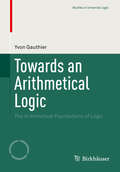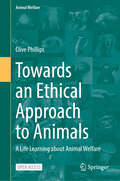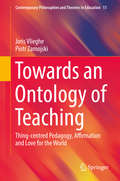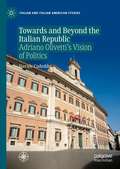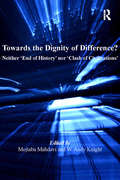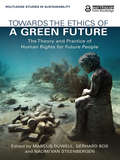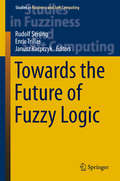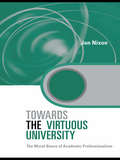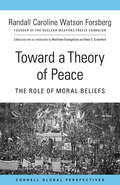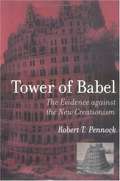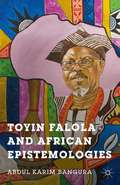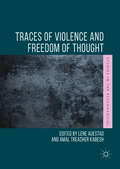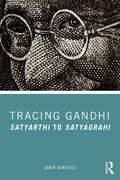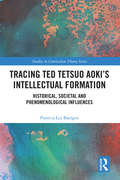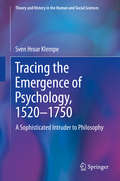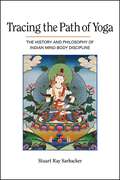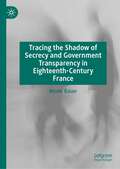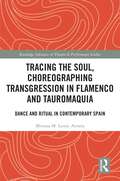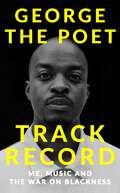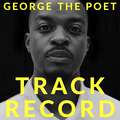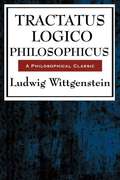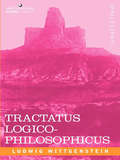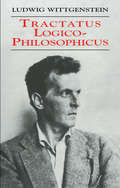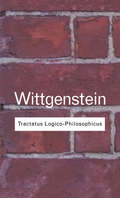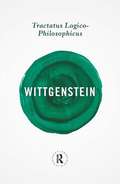- Table View
- List View
Towards an Arithmetical Logic
by Yvon GauthierThis book offers an original contribution to the foundations of logic and mathematics and focuses on the internal logic of mathematical theories, from arithmetic or number theory to algebraic geometry. Arithmetical logic is the term used to refer to the internal logic of classical arithmetic, here called Fermat-Kronecker arithmetic and combines Fermat's method of infinite descent with Kronecker's general arithmetic of homogeneous polynomials. The book also includes a treatment of theories in physics and mathematical physics to underscore the role of arithmetic from a constructivist viewpoint. The scope of the work intertwines historical, mathematical, logical and philosophical dimensions in a unified critical perspective; as such, it will appeal to a broad readership from mathematicians to logicians, to philosophers interested in foundational questions. Researchers and graduate students in the fields of philosophy and mathematics will benefit from the author's critical approach to the foundations of logic and mathematics.
Towards an Ethical Approach to Animals: A Life Learning about Animal Welfare (Animal Welfare #26)
by Clive PhillipsIn two parts, this open access work offers a broad and often unconventional approach to animal ethics, written by a pioneer in animal welfare science and ethics. The author Clive Phillips, Australia's first professor of animal welfare, first describes his life experience and career in the field, which enabled him to provide thoughts and possible solutions to some of the key problems in human-animal relations following in section two. His memoirs describe a journey from privileged upbringing in the Christian tradition to confronting Australian livestock industries with some of their traditional practices. Experiences meeting livestock farmers, industry supporters and national representative bodies taught him new approaches to the ways in which we manage animals. After building one of the largest animal welfare centers worldwide, Clive Phillips retired and pursues his animal welfare mission independently. The second part introduces novel aspects that evolved with the author over several decades of involvement in animal welfare science. This part takes a wide perspective, asking how important and unique our animal kingdom is, how did it evolve and why, and what are the key issues for our treatment of other animals? It concludes by considering our future relationship with animals and how this will change with current developments in society and in particular contemporary attitudes toward the consumption of animals. This historical and futuristic look at animal ethics is unique, making this book a thought provoking read for all interested. The audience includes, but is not limited to, the areas of veterinary science, ethics and welfare, animal industries, universities and philosophy departments.
Towards an Ontology of Teaching: Thing-centred Pedagogy, Affirmation and Love for the World (Contemporary Philosophies and Theories in Education #11)
by Joris Vlieghe Piotr ZamojskiThis book opens an original and timely perspective on why it is we teach and want to pass on our world to the new generation. Teaching is presented in this book as a way of being, rather than as a matter of expertise, which is driven by love for a subject matter. With the help of philosophical thinkers such as Arendt, Badiou and Agamben, the authors articulate a fully positive account of education that goes beyond the critical approach, which has become prevailing in much contemporary educational theory, and which testifies to a hate of the world and to a confusion of what politics and education are about. Therefore, the authors develop the idea of a thing-centred pedagogy, as opposed to both teacher-centred and student-centred approaches. The authors furthermore illustrate their purely educational account of teaching by looking at the writing and the television performance of Leonard Bernstein who embodies what teaching out of love and care for a subject is all about. This book is of interest to all those concerned with fundamental and philosophical questions about education and to those interested in (music) education.
Towards and Beyond the Italian Republic: Adriano Olivetti’s Vision of Politics (Italian and Italian American Studies)
by Davide CadedduThis book examines the historical process that led to the foundation of the Italian Republic and its constitution, viewed through the personal experiences and political reflections of Adriano Olivetti (between 1919 and 1960), general manager and president of the well-known typewriter manufacturer “Ing. C. Olivetti & C.” An unbroken line of reasoning linked his maturing political reflections during the two post-war periods. The historical context of the 1950s did not prove to be very propitious, but the guidelines dispersed throughout the Italian cultural and political world from the movement that Olivetti founded were certainly seminal – generating a legacy of ideas that has only in part been recognized. What makes this study distinctive is the original approach to reading the history of Italy through Adriano Olivetti’s eyes and thoughts, far from the more common Christian Democratic or Communist perspective of those years. It is simply another view of what the Italian Republic could be and was not.
Towards the Dignity of Difference?: Neither 'End of History' nor 'Clash of Civilizations' (Ethics and Global Politics)
by Mojtaba MahdaviThe rise of popular social movements throughout the Middle East, North Africa, Europe and North America in 2011 challenged two hegemonic discourses of the post-Cold War era: Francis Fukuyama's 'The End of History' and Samuel Huntington's 'The Clash of Civilizations.' The quest for genuine democracy and social justice and the backlash against the neoliberal order is a common theme in the global mass protests in the West and the East. This is no less than a discursive paradigm shift, a new beginning to the history, a move towards new alternatives to the status quo. This book is about difference and dialogue; it embraces The Dignity of Difference and promotes dialogue. However, it also demonstrates the limits of dialogue as a useful and universal approach for resolving conflicts, particularly in cases involving asymmetric and unequal power relations. The distinguished group of authors suggests in this volume that there is a 'third way' of addressing global tensions - one that rejects the extremes of both universalism and particularism. This third way is a radical call for an epistemic shift in our understanding of 'us-other' and 'good-evil', a radical approach toward accommodating difference as well as embracing the plural concept of 'the good'. The authors strengthen their alternative approach with a practical policy guide, by challenging existing policies that either exclude or assimilate other cultures, that wage the constructed 'global war on terror,' and that impose a western neo-liberal discourse on non-western societies. This important book will be essential reading for all those studying civilizations, globalization, foreign policy, peace and security studies, multiculturalism and ethnicity, regionalism, global governance and international political economy.
Towards the Ethics of a Green Future: The Theory and Practice of Human Rights for Future People (Routledge Studies in Sustainability)
by Gerhard Bos Marcus Düwell Naomi Van SteenbergenWhat are our obligations towards future generations who stand to be harmed by the impact of today’s environmental crises? This book explores ecological sustainability as a human rights issue and examines what our long-term responsibilities might be. This interdisciplinary collection of chapters provides a basis for understanding the debates on the provision of sustainability for future generations from a diverse set of theoretical standpoints. Covering a broad range of perspectives such as risk and uncertainty, legal implementation, representation, motivation and economics, Towards the Ethics of a Green Future sets out the key questions involved in this complex ethical issue. The contributors bring theoretical discussions to life through the use of case studies and real-world examples. The book also includes clear and tangible recommendations for policymakers on how to put the suggestions proposed within the book into practice. This book will be of great interest to all researchers and students concerned with issues of sustainability and human rights, as well as scholars of environmental politics, law and ethics more generally.
Towards the Future of Fuzzy Logic
by Janusz Kacprzyk Rudolf Seising Enric TrillasThis book provides readers with a snapshot of the state-of-the art in fuzzy logic. Throughout the chapters, key theories developed in the last fifty years as well as important applications to practical problems are presented and discussed from different perspectives, as the authors hail from different disciplines and therefore use fuzzy logic for different purposes. The book aims at showing how fuzzy logic has evolved since the first theory formulation by Lotfi A. Zadeh in his seminal paper on Fuzzy Sets in 1965. Fuzzy theories and implementation grew at an impressive speed and achieved significant results, especially on the applicative side. The study of fuzzy logic and its practice spread all over the world, from Europe to Asia, America and Oceania. The editors believe that, thanks to the drive of young researchers, fuzzy logic will be able to face the challenging goals posed by computing with words. New frontiers of knowledge are waiting to be explored. In order to motivate young people to engage in the future development of fuzzy logic, fuzzy methodologies, fuzzy applications, etc. , the editors invited a team of internationally respected experts to write the present collection of papers, which shows the present and future potentials of fuzzy logic from different disciplinary perspectives and personal standpoints.
Towards the Virtuous University: The Moral Bases of Academic Practice (Key Issues in Higher Education)
by Jon NixonA good university is invariably assumed to be one which is managerially effective in terms of its economic efficiency, and is judged in terms of entrepreneurialism, self-promotion and competitive innovation. This book argues that in the majority of institutions, these goals are being pursued to the exclusion of academic excellence and public service. It proposes that there is a marked lack of intellectual leadership at senior management level within HE institutions and that academic workers must assume responsibility for the moral purposefulness of their institutions. This will not be a retreat into the old values of an elitist 'ivory tower', but a rejection of the current deeply stratified university system which prematurely selects students for differentiated institutional streams.
Toward a Theory of Peace: The Role of Moral Beliefs
by Randall Caroline ForsbergMilitary analyst, peace activist, teacher, and social theorist Randall Caroline Watson Forsberg (1943–2007) founded the Nuclear Freeze campaign and the Institute for Defense and Disarmament Studies. In "Toward a Theory of Peace," completed in 1997 and published for the first time here, she delves into a vast literature in psychology, anthropology, archeology, sociology, and history to examine the ways in which changing moral beliefs came to stigmatize forms of "socially sanctioned violence" such as human sacrifice, cannibalism, and slavery, eventually rendering them unacceptable. Could the same process work for war?Edited and with an introduction by political scientists Matthew Evangelista (Cornell University) and Neta C. Crawford (Boston University), both of whom worked with Forsberg.
Tower of Babel: The Evidence Against the New Creationism
by Robert T. PennockFinalist in the ForeWord Magazine Book of the Year Awards. Creationism is no longer the simple notion it once was taken to be. Its new advocates have become more sophisticated in how they present their views, speaking of "intelligent design" rather than "creation science" and aiming their arguments against the naturalistic philosophical method that underlies science, proposing to replace it with a "theistic science." The creationism controversy is not just about the status of Darwinian evolution--it is a clash of religious and philosophical worldviews, for a common underlying fear among Creationists is that evolution undermines both the basis of morality as they understand it and the possibility of purpose in life. In Tower of Babel, philosopher Robert T. Pennock compares the views of the new creationists with those of the old and reveals the insubstantiality of their arguments. One of Pennock's major innovations is to turn from biological evolution to the less charged subject of linguistic evolution, which has strong theoretical parallels with biological evolution, both in content and in the sort of evidence scientists use to draw conclusions about origins. Of course, an evolutionary view of language does conflict with the Bible, which says that God created the variety of languages at one time as punishment for the Tower of Babel. Several chapters deal with the work of Phillip Johnson, a highly influential leader of the new Creationists. Against his and other views, Pennock explains how science uses naturalism and discusses the relationship between factual and moral issues in the creationism-evolution controversy. The book also includes a discussion of Darwin's own shift from creationist to evolutionist and an extended argument for keeping private religious beliefs separate from public scientific knowledge.
Toyin Falola and African Epistemologies
by Abdul Karim BanguraWhile there are five important festschriften on Toyin Falola and his work, this book fulfills the need for a single-authored volume that can be useful as a textbook. I develop clearly articulated rubrics and overarching concepts as the foundational basis for analyzing Falola's work.
Traces of Violence and Freedom of Thought
by Lene Auestad Amal Treacher KabeshThis book examines how people cannot escape being tainted, whether actively engaged or not, by violence in its countless manifestations. The essays encompass a wide range of theoretical resources, methodological approaches and geo-political areas. They describe how images and fragments of traumatic and violent scenarios are transported from one generation's unconscious to that of another, leading to cycles of repetition and retaliation, restricting the freedom to imagine alternatives and inhabit alternative positions. The authors all work within a psychosocial framework by unsettling the boundaries between psyche-social. Four themes are addressed: violence of speech, violence and domination, repetition and violence, and the possibility of reparation or renewal. Due to its theoretical engagements and the case studies provided, this interdisciplinary collection will be of value to postgraduate and undergraduate students of psychology, philosophy, politics and history.
Tracing Gandhi: Satyarthi to Satyagrahi
by Samir BanerjeeThis book traces the journey of Mahatma Gandhi, from being a simple and truth-seeking human being, a satyarthi, to a committed, conscious and social human being, a satyagrahi. It specifically looks at this critical transformation during the time Gandhi was in South Africa. The central argument of the book is that Gandhi evolved from being a satyarthi to a satyagrahi in South Africa. Subsequently in India, he consolidated his orientation with an emphasis on praxis, by developing his ideas as instruments for social and individual struggles. Marked by a series of events, this period was an intense quest of self-realization and understanding, and shows his journey from being Mohandas Karamchand Gandhi to being Mahatma Gandhi. The book discusses various elements of Gandhian thought and praxis – morality, wisdom, non-violence, truth, social justice, dharma, trusteeship, education, sarvodaya, Hind Swaraj, swadeshi, and social service – and interprets the relevance of Gandhi’s thought in the modern world by highlighting its unique significance for social transformation and change. Lucid and accessible, the book will be useful to scholars and researchers of Gandhi studies, Indian political thought, modern Indian history, and political studies.
Tracing Ted Tetsuo Aoki’s Intellectual Formation: Historical, Societal, and Phenomenological Influences (Studies in Curriculum Theory Series)
by Patricia Liu BaergenThrough careful examination of Ted Aoki’s life and work within its historical, societal and intellectual context, this text advances a new appreciation of the national distinctiveness of Canadian curriculum studies. The book draws unique comparison between Aoki’s writings and Heidegger’s concept of "being-in-the-world." In exploring Aoki’s narratives on momentous life events, the author attends to the interwoven, dynamic and poetic essence of the scholar’s intellectual formation and identifies a critically reflective style of theorizing. By contextualizing Aoki’s narrations on his momentous life events, the text engages with Aoki’s critical reflective and unique style of theorizing and foregrounds the prominent influence of Heidegger’s phenomenology and writings on Aoki’s thinking. A major contribution to understanding Aoki’s curriculum scholarship, this book is an important resource for researchers and post-graduate students working across curriculum studies discourse.
Tracing the Emergence of Psychology, 1520–1750: A Sophisticated Intruder to Philosophy (Theory and History in the Human and Social Sciences)
by Sven Hroar KlempeThis book pursues the very first use of the term “psychology”, which is traced back to 1520. The appearance of the term was not as a part of philosophy. Thus, the main hypothesis of this book is that psychology from the very beginning was a stranger to philosophy. It demonstrates that even Aristotle used his thesis on the soul to delineate philosophy from psychological aspects. It is therefore suggested that psychological wisdom and knowledge has been retained and in popular culture as long as humans have reflected upon themselves. There were, however, several reasons for why psychology appeared as a part of philosophy at around the year 1600. One important factor was Humanism, which among other things had challenged Aristotelian logic. Another important movement was Protestantism. Luther’s emphasis on the need to confess one’s sin, led to a certain interest to explore the human nature. His slogan, “the scripture alone” represented an attack on the close relationship that had existed between theology and philosophy. Yet when philosophy was thrown out of theology, it was left without the basic theological tenets that had guided philosophical speculations for centuries in Europe. Hence, this book pursues how philosophy gradually adopts and includes psychological aspects to rebuild the foundation for philosophy. This culminates partly with the British empiricists. Yet they did not apply the term psychology. It was the German and partly ignored philosopher Christian Wolff, who opened up modern understanding of psychology with the publication of Psychologia empirica in 1732. This publication had a tremendous impact on the enlightenment in the modern Europe.
Tracing the Path of Yoga: The History and Philosophy of Indian Mind-Body Discipline
by Stuart Ray SarbackerClear, accessible, and meticulously annotated, Tracing the Path of Yoga offers a comprehensive survey of the history and philosophy of yoga that will be invaluable to both specialists and to nonspecialists seeking a deeper understanding of this fascinating subject. Stuart Ray Sarbacker argues that yoga can be understood first and foremost as a discipline of mind and body that is represented in its narrative and philosophical literature as resulting in both numinous and cessative accomplishments that correspond, respectively, to the attainment of this-worldly power and otherworldly liberation. Sarbacker demonstrates how the yogic quest for perfection as such is situated within the concrete realities of human life, intersecting with issues of politics, economics, class, gender, and sexuality, as well as reflecting larger Indic religious and philosophical ideals.
Tracing the Shadow of Secrecy and Government Transparency in Eighteenth-Century France
by Nicole BauerThis book traces changing attitudes towards secrecy in eighteenth-century France, and explores the cultural origins of ideas surrounding government transparency. The idea of keeping secrets, both on the part of individuals and on the part of governments, came to be viewed with more suspicion as the century progressed. By the eve of the French Revolution, writers voicing concerns about corruption saw secrecy as part and parcel of despotism, and this shift went hand in hand with the rise of the idea of transparency. The author argues that the emphasis placed on government transparency, especially the mania for transparency that dominated the French Revolution, resulted from the surprising connections and confluence of changing attitudes towards honour, religious movements, rising nationalism, literature, and police practices. Exploring religious ideas that associated secrecy with darkness and wickedness, and proto-nationalist discourse that equated foreignness with secrecy, this book demonstrates how cultural shifts in eighteenth-century France influenced its politics. Covering the period of intense fear during the French Revolution and the paranoia of the Reign of Terror, the book highlights the complex interplay of culture and politics and provides insights into our attitudes towards secrecy today.
Tracing the Soul, Choreographing Transgression in Flamenco and Tauromaquia: Dance and Ritual in Contemporary Spain (Routledge Advances in Theatre & Performance Studies)
by Miriana M. Lausic ArratiaThis book analyzes gesture, ritual, and performance in flamenco and tauromaquia the extended definition of bullfighting within the visual arts and poetry in contemporary Spain. Based on the author’s extensive ethnographic field research, it emerges from recent critical thinking on the body in dance and performance studies. The main argument is that flamenco and la corrida are a type of choreographic writing, as both corporeal inscription and a field of spacing and timing bordered by death. Transgression is conceived as the breaching and blurring of limits between two seemingly opposed spaces: the corporeal and incorporeal; the animal and human; the real and the imaginary; life and death. Flamenco and tauromaquia incorporate and reshape cultural and historical layers of memory and sense, which are marked by multiple social and political intersections. This book fills a gap in the knowledge of their interconnectedness. It equally contributes to resolving an epistemological crisis in dance studies, to the interplay between the visible and the invisible in choreographed movements. This interdisciplinary text serves scholars across fields including Dance, Cultural Studies, Anthropology, and Iberian and Latin American Studies, particularly
Track Record: THE REVOLUTIONARY MEMOIR FROM THE UK'S MOST CREATIVE VOICE
by George the PoetThe ground-breaking memoir by acclaimed rapper and podcast host, George the PoetBorn to Ugandan parents on the St Raphael's Estate in Neasden, north-west London, George has always been an ambitious storyteller. Influenced by his hometown, George started MCing , and eventually found his voice in poetry and with it an avenue for change.Track Record: Me, Music, and the War on Blackness sheds light on George's upbringing and artistic career. He looks back at his education, his time at university, and his beginnings as a musician. We are given an insight into the forces that have shaped him and the stories he chooses to tell. As with George's other work, Track Record goes beyond the traditional memoir and takes the reader on a journey throughout history. George dives deep into the complexities of the economy and interrogates the legacy of colonialism. He reflects on music and its power as a political force - how it can be a catalyst for social power and economic change. By weaving a story that is both personal and political, George delivers an incredibly powerful and unique perspective on the world around us. Honest, thought-provoking and lyrical, Track Record is a fascinating insight by an inimitable storyteller.
Track Record: THE REVOLUTIONARY MEMOIR FROM THE UK'S MOST CREATIVE VOICE
by George the Poet**The ground-breaking memoir by acclaimed rapper and podcast host, George the Poet**__________'When Grime became the soundtrack to our lives, it gave a voice to the hustle. We were all looking for money, but it was deeper than that; we were looking for a future.'George the Poet knows better than anybody the importance of understanding your surroundings. Born to Ugandan parents on the St Raphael's Estate in Neasden, north-west London, George Mpanga has always been aware of his community. It was both his teacher and his inspiration - giving him the language, the experiences, and the skills to become the person he is today.In Track Record, George unveils the power dynamics that shape our world, shedding light on the forces that restrict Black creativity and put limits on Black excellence. By interrogating the history of colonialism and exploring capitalism's racist legacy, George offers a fresh perspective on the world around us.Delving into the music scene and iconic films from his childhood, as well as crucial political and economic moments in history, this book provides the backstory of where we are today.Honest, thought-provoking, and passionate, Track Record is a ground-breaking memoir by one of the UK's most unique voices.__________(P)2023 Hodder & Stoughton Limited
Tractatus Logico Philosophicus
by Ludwig Wittenstein"Tractatus Logico-Philosophicus may be the most important book of philosophy written during the twentieth century. Wittgenstein's writing style is clear, succinct, and accessible. Bertrand Russell claimed that "I cannot see any point on which it is wrong. But to have constructed a theory of logic which is not at any point obviously wrong is to have achieved a work of extraordinary difficulty and importance." Required ready for anyone interested in philosophy." Wilder Publications is a green publisher. All of our books are printed to order. This reduces waste and helps us keep prices low while greatly reducing our impact on the environment.
Tractatus Logico-Philosophicus
by Ludwig WittgensteinAustrian philosopher Lutwig Wittegenstein constructs a series of carefully and precisely numbered propositions on the relationship between language, logic, and reality, using a numbering system to show nested relationships between the propositions. Considered one of the major recent works of philosophy¿a reputation enhanced, undoubtedly, by Bertrand Russell¿s glowing introduction¿this edition is a reproduction of the translation by C.K. Ogden, first published in 1922, for which Wittgenstein himself assisted in the preparation of the English-language manuscript. Students of philosophy and those fascinated by the history of ideas will want a copy of this essential volume.
Tractatus Logico-Philosophicus (Barnes And Noble Library Of Essential Reading #Vol. 4447)
by Ludwig Wittgenstein"Philosophy is not a theory," asserted Austro-British philosopher Ludwig Wittgenstein (1889–1951), "but an activity." In this 1921 opus, his only philosophical work published during his lifetime, Wittgenstein defined the object of philosophy as the logical clarification of thoughts and proposed the solution to most philosophic problems by means of a critical method of linguistic analysis. In proclaiming philosophy as a matter of logic rather than of metaphysics, Wittgenstein created a sensation among intellectual circles that influenced the development of logical positivism and changed the direction of 20th-century thought.Beginning with the principles of symbolism and the necessary relations between words and objects, the author applies his theories to various branches of traditional philosophy, illustrating how mistakes arise from inappropriate use of symbolism and misuses of language. After examining the logical structure of propositions and the nature of logical inference, he discusses the theory of knowledge as well as principles of physics and ethics and aspects of the mystical.Supervised by the author himself, this translation from the German by C. K. Ogden is regarded as the definitive text. A magisterial introduction by the distinguished philosopher Bertrand Russell hails Wittgenstein's achievement as extraordinarily important, "one which no serious philosopher can afford to neglect." Introduction by Bertrand Russell.
Tractatus Logico-Philosophicus (Routledge Classics)
by Ludwig WittgensteinPerhaps the most important work of philosophy written in the twentieth century, Tractatus Logico-Philosophicus was the only philosophical work that Ludwig Wittgenstein published during his lifetime. Written in short, carefully numbered paragraphs of extreme brilliance, it captured the imagination of a generation of philosophers. For Wittgenstein, logic was something we use to conquer a reality which is in itself both elusive and unobtainable. He famously summarized the book in the following words: 'What can be said at all can be said clearly; and what we cannot talk about we must pass over in silence.' David Pears and Brian McGuinness received the highest praise for their meticulous translation. The work is prefaced by Bertrand Russell's original introduction to the first English edition.
Tractatus Logico-Philosophicus (Routledge Great Minds)
by Ludwig WittgensteinLudwig Wittgenstein is one of the greatest and most fascinating philosophers of all time. His Tractatus Logico-Philosophicus, composed in a series of remarkable numbered propositions, was the only book he published in his lifetime. He tackles nothing less than the question of whether there is such a thing as a logically perfect language and, armed with it, what we can say about the nature of the world itself. Pushing the limits of language, logic and philosophy, the Tractatus is a brilliant, cryptic and hypnotic tour de force, exerting a major impact on twentieth-century philosophy and stirring the imagination today. With a new foreword by Ray Monk.
